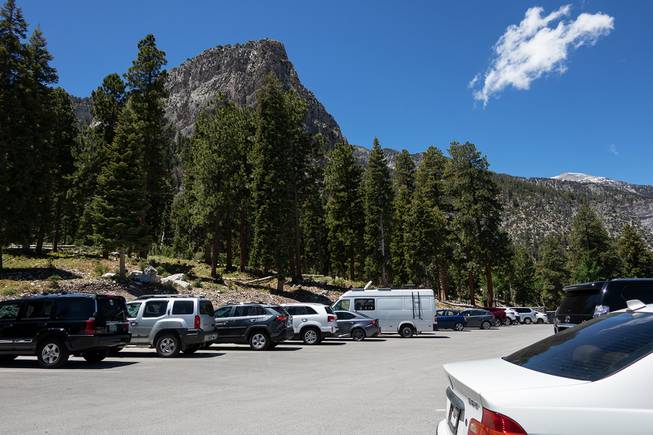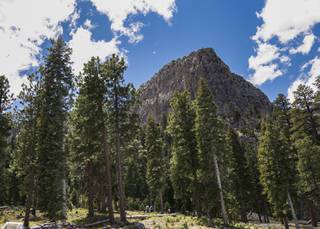
Cars fill the parking lot at the Cathedral Rock trailhead on Mount Charleston, Monday, May 18, 2020.
Tuesday, May 19, 2020 | 2 a.m.
Mount Charleston resident Misty Haji-Sheikh is used to some visitors ignoring the “no parking” signs near her house during peak hiking times. But she can’t say the same about the recent proliferation of human feces in the area.
With public restrooms on the mountain closed since March in response to the threat of the coronavirus pandemic, more people have been relieving themselves outside without following proper protocols, Haji-Sheikh said. Rather than digging a hole on a trail to defecate in and following the leave-no-trace mantra, some visitors have been “peeing and pooping literally everywhere,” sometimes leaving behind toilet paper, too, Haji-Sheikh said.
“They’re doing it right on the pathways and the roads,” she said.
It’s one of several issues that have come up in the Mount Charleston area since most businesses in Nevada shut down to slow the spread of COVID-19, according to Mount Charleston residents and U.S. Forest Service employees.
Although campgrounds, picnic areas, the visitor center, restrooms and some parking facilities have been closed, the Forest Service has kept the area open because of the “complexity of land and road ownership” and the inability to enforce closures, said Erica Hupp, public affairs staff officer for the Forest Service.
But even with no services on the mountain for the better half of the last two months, more people have been visiting the area than is typical for this time of year. Before Lake Mead reopened to annual pass holders this month, Mount Charleston was one of the few popular recreation spots near Las Vegas that hadn’t been shut down.
“We’ve had record-breaking numbers of people. It’s been absolutely crazy,” Hupp said.
Trash bins on the mountain have been overflowing due to the high volume of visitors and the fact that staff have tried to limit interactions with visitors to minimize the risk of COVID-19, she said. Although Forest Service law enforcement have access to personal protective equipment (PPE) such as masks, not all staff have protective wear, which prompted the Forest Service to modify trash pickup, Hupp said.
“Due to the national shortage of personal protective equipment, neither the Forest (Service) nor our nonprofit partners were able to procure the PPE recommended by the CDC to keep our employees and partners safe,” she wrote in an email. “The Forest hired a company to pick up the trash in the interim, and they did their best to keep up with the demand.”
Other problems such as graffiti, vandalism, traffic jams and parking in unauthorized areas have also been on the rise, said Don Harris, patrol captain with Forest Service Law Enforcement and Investigations. Campfires, which are not allowed in the Spring Mountains this time of year due to the fire risk, have nonetheless been reported more frequently than is typical as well, according to Harris and Hupp.
“Usually we don’t see (fires) this early and at the size they are. We’ve had people have bonfires up there,” Hupp said.
The problems aren’t just inconvenient for residents. Parking in unauthorized areas can obstruct emergency vehicles, while pollution and human and dog excrement disrupt the fragile ecology of the area, said resident Kim Koster. Feces can infect the water supply, and food and trash can harm wildlife when consumed, she said.
Volunteers and neighbors have been trying to pick up the trash and feces themselves, but that could also put them at risk of getting or spreading COVID-19, Koster added.
“I’m not sure that all the volunteers are properly outfitted to be doing that,” she said.
There have also been reports of people failing to practice social distancing and traveling on the mountain in groups larger than nine people, which are prohibited in the Spring Mountains to slow the spread of COVID-19. Although it might seem like people traveling in large groups are only putting themselves at risk of COVID-19, it can create challenges for residents trying to minimize their chances of infection, Haji-Sheikh said.
“It’s a problem,” she said. “It’s really hard to get to my mailbox because people are parking right next to the box, and they’re in groups.”
In response to the challenges in the area, the Forest Service has been discouraging people from visiting Mount Charleston, suggesting that people instead recreate close to home in the form of neighborhood walks or travel to more remote areas with fewer visitors.
“With the amount of people coming up to the mountain right now, I’d probably look at even farther areas out to recreate, just to make sure we’re spreading people out far enough away from each other,” Harris said.
But as temperatures climb in the Las Vegas Valley and with Memorial Day coming up, Hupp worries that crowds could increase. It’s also possible that more people will start to visit Mount Charleston because they perceive COVID-19 to be less of a threat now, she said.
“As people saw we weren’t having the (predicted) numbers of COVID-19 cases, some people maybe are feeling more comfortable getting out and about,” Hupp said.
As of Saturday, visitors now have one option for restrooms and indoor and outdoor trash bins. The Retreat on Charleston Peak is letting anyone use its facilities, and it has also opened for curbside takeout and limited dining, said owner Deanna Crossman.
“We just want a place where they can have those facilities and the resources to be a good neighbor and good steward in the park, because there isn’t someone else who can do that,” Crossman said.
While Koster and Haji-Sheikh have been frustrated by some visitors’ behavior, they are also happy to see so many people recreating in the area with their families. They just ask that those who visit the mountain prepare to be self-sufficient, take home their trash and respect wildlife, residents, law enforcement and fellow hikers, they said.
“I understand the need to get out of the house, but not at the expense of forgetting all your manners,” Haji-Sheikh said.

